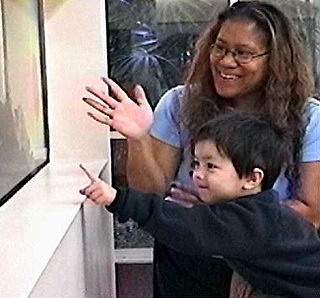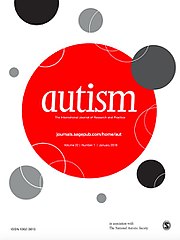
Asperger syndrome (AS), also known as Asperger's, is a neurodevelopmental condition characterized by significant difficulties in social interaction and nonverbal communication, along with restricted and repetitive patterns of behavior and interests. The syndrome is no longer recognized as a diagnosis in itself, having been merged with other conditions into autism spectrum disorder (ASD). It was considered to differ from other diagnoses that were merged into ASD by relatively unimpaired spoken language and intelligence.
The diagnostic category pervasive developmental disorders (PDD), as opposed to specific developmental disorders (SDD), was a group of disorders characterized by delays in the development of multiple basic functions including socialization and communication. It was defined by the Diagnostic and Statistical Manual of Mental Disorders (DSM), and the International Classification of Diseases (ICD).
Developmental disorders comprise a group of psychiatric conditions originating in childhood that involve serious impairment in different areas. There are several ways of using this term. The most narrow concept is used in the category "Specific Disorders of Psychological Development" in the ICD-10. These disorders comprise developmental language disorder, learning disorders, motor disorders, and autism spectrum disorders. In broader definitions ADHD is included, and the term used is neurodevelopmental disorders. Yet others include antisocial behavior and schizophrenia that begins in childhood and continues through life. However, these two latter conditions are not as stable as the other developmental disorders, and there is not the same evidence of a shared genetic liability.

Diagnoses of autism have become more frequent since the 1980s, which has led to various controversies about both the cause of autism and the nature of the diagnoses themselves. Whether autism has mainly a genetic or developmental cause, and the degree of coincidence between autism and intellectual disability, are all matters of current scientific controversy as well as inquiry. There is also more sociopolitical debate as to whether autism should be considered a disability on its own.
Developmental disability is a diverse group of chronic conditions, comprising mental or physical impairments that arise before adulthood. Developmental disabilities cause individuals living with them many difficulties in certain areas of life, especially in "language, mobility, learning, self-help, and independent living". Developmental disabilities can be detected early on and persist throughout an individual's lifespan. Developmental disability that affects all areas of a child's development is sometimes referred to as global developmental delay.

Autism therapies include a wide variety of therapies that help people with autism, or their families. Such methods of therapy seek to aid autistic people in dealing with difficulties and increase their functional independence.
Natural Product Reports is a monthly peer-reviewed scientific journal published by the Royal Society of Chemistry. It publishes reviews commissioned by the editorial board on all areas of natural products research. The editors-in-chief is Tobias Gulder.
Johnny Lee Matson is a former professor in the Department of Psychology at Louisiana State University recognized for his work in the social sciences. Matson's research topics were development, assessment and treatment of co-morbid conditions in developmental intellectual disabilities, including autism spectrum disorders. Matson's high number of self publications, self citations, and peer review practices have been questioned by social scientists. In 2023 it was reported that Matson had 24 of his research papers retracted due to scientific misconduct.

Intellectual disability (ID), also known as general learning disability in the United Kingdom and formerly mental retardation, is a generalized neurodevelopmental disorder characterized by significantly impaired intellectual and adaptive functioning. It is defined by an IQ under 70, in addition to deficits in two or more adaptive behaviors that affect everyday, general living. Intellectual functions are defined under DSM-V as reasoning, problem‑solving, planning, abstract thinking, judgment, academic learning, and learning from instruction and experience, and practical understanding confirmed by both clinical assessment and standardized tests. Adaptive behavior is defined in terms of conceptual, social, and practical skills involving tasks performed by people in their everyday lives.

Classic autism, also known as childhood autism, autistic disorder, (early) infantile autism, infantile psychosis, Kanner's autism,Kanner's syndrome, or just autism, is a neurodevelopmental condition first described by Leo Kanner in 1943. It is characterized by atypical and impaired development in social interaction and communication as well as restricted, repetitive behaviors, activities, and interests. These symptoms first appear in early childhood and persist throughout life.

Paul Wehman is a professor of counseling and special education at the School of Education, Virginia Commonwealth University. He also is Director of the Rehabilitation Research and Training Center.

The Journal of Autism and Developmental Disorders is a monthly peer-reviewed medical journal covering research on all aspects of autism spectrum disorders and related developmental disabilities. The journal was established in 1971 as the Journal of Autism and Childhood Schizophrenia, obtaining its current title in 1979. It is published by Springer Science+Business Media and the editor-in-chief is Lynn Kern Koegel.
The Scandinavian Journal of Occupational Therapy is a peer-reviewed medical journal covering the field of occupational therapy. It is published as 8 issues per year by Taylor & Francis and the editor-in-chief is Anita Björklund.

Autism, formally called autism spectrum disorder (ASD) or autism spectrum condition (ASC), is a neurodevelopmental disorder characterized by deficits in social communication and social interaction, and repetitive or restricted patterns of behaviors, interests, or activities, which can include hyper- and hyporeactivity to sensory input. Autism is a spectrum disorder, meaning that it can manifest very differently in each person. For example, some are nonspeaking, while others have proficient spoken language. Because of this, there is wide variation in the support needs of people across the autism spectrum.

Autism is a peer-reviewed academic journal covering research on autism. It is published eight times a year by SAGE Publications in association with the National Autistic Society. The journal was established in 1997 and the editor-in-chief is Sue Fletcher-Watson.
Michael Lee Wehmeyer is the Ross and Marianna Beach Distinguished Professor in Special Education in the Department of Special Education at the University of Kansas. His research focuses on self-determination and self-determined learning, the application of positive psychology and strengths-based approaches to disability, and the education of students with intellectual or developmental disabilities. He is Director and Senior Scientist at Kansas University's Beach Center on Disability. He formerly directed the Kansas University Center on Developmental Disabilities.
Gary B. Mesibov is a licensed psychologist, psychology professor, editor and an author.
Research in Autism Spectrum Disorders is a peer-reviewed medical journal published monthly by Elsevier. It covers applied topics pertaining to autism spectrum disorders. Since the spring of 2023, the editor-in-chief is David Beversdorf.
Jeffrey Scott Sigafoos is a New Zealand professor of educational psychology.
Leonard Abbeduto is a psychologist known for his research on individuals with neurodevelopmental disorders, including Fragile X syndrome, autism spectrum disorder, and Down syndrome, and factors that influence their linguistic development over the lifespan. He is the Tsakopoulos-Vismara Endowed Chair of Psychiatry and Behavioral Sciences at University of California, Davis. He serves as Director of Research at the Medical Investigation of Neurodevelopment Disorders (MIND) Institute, which was launched in 2001. Prior to his affiliation with the University of California, Davis, Abbeduto was the Associate Director for Behavioral Sciences at the Waisman Center at the University of Wisconsin-Madison.








